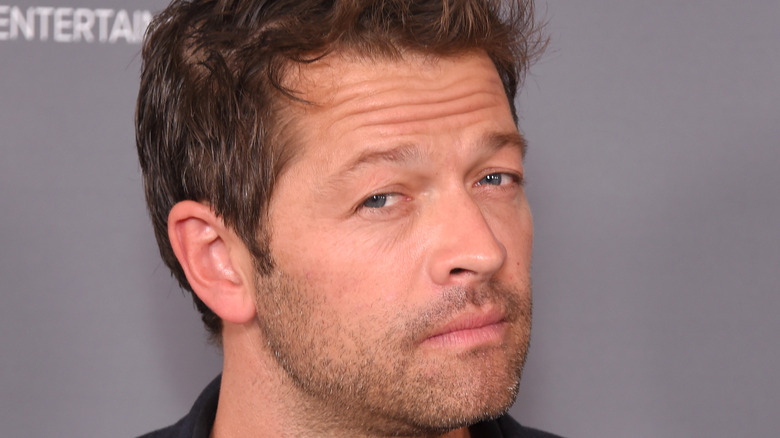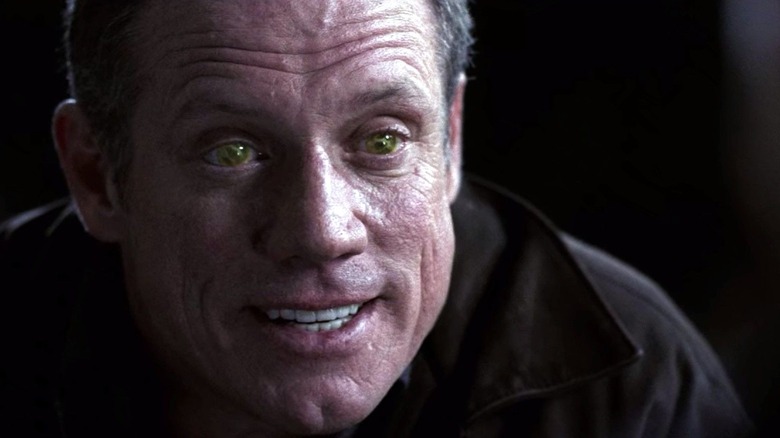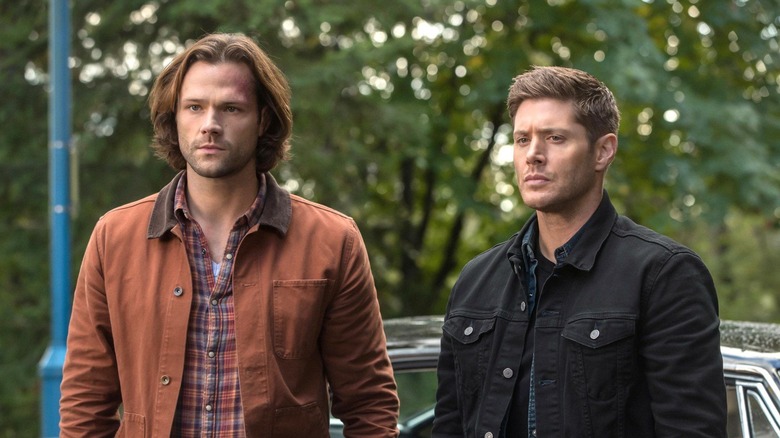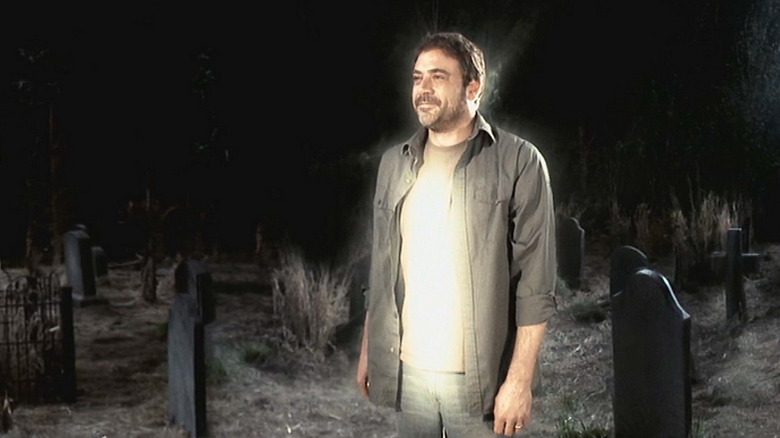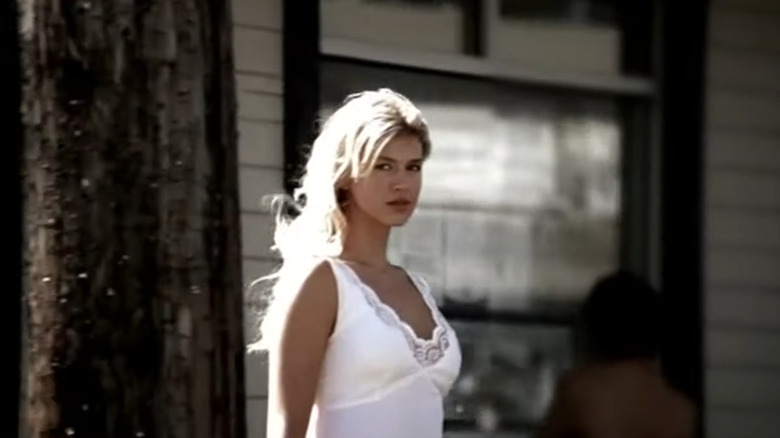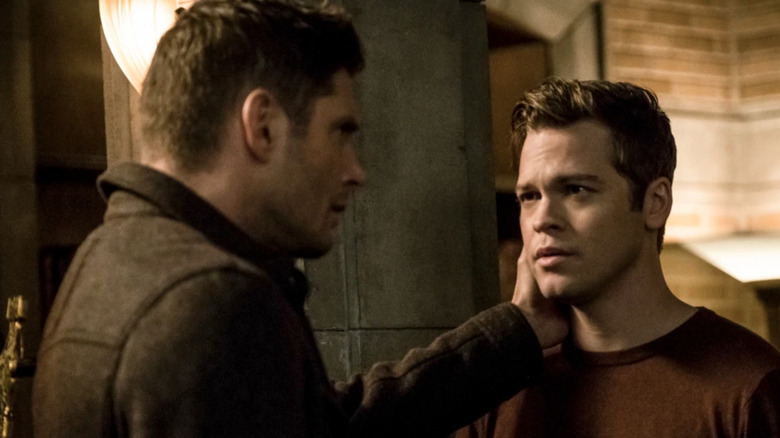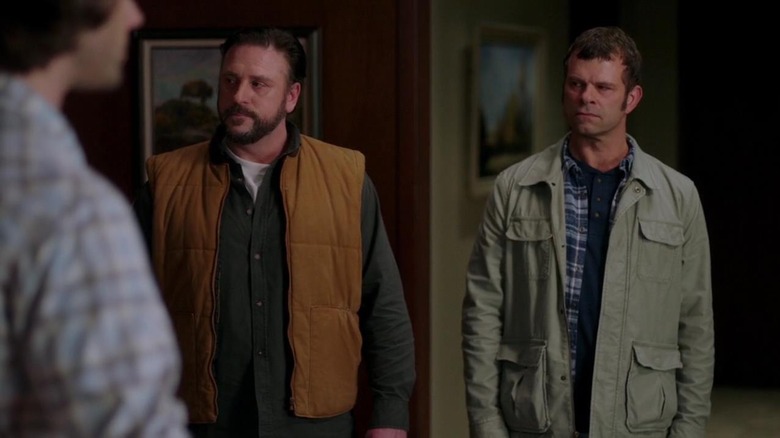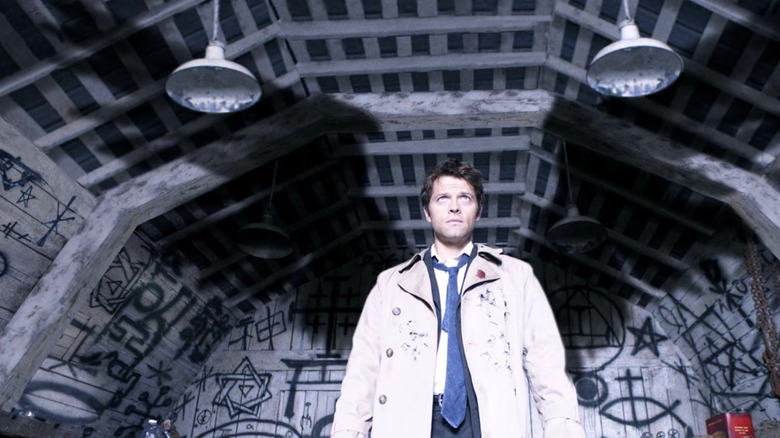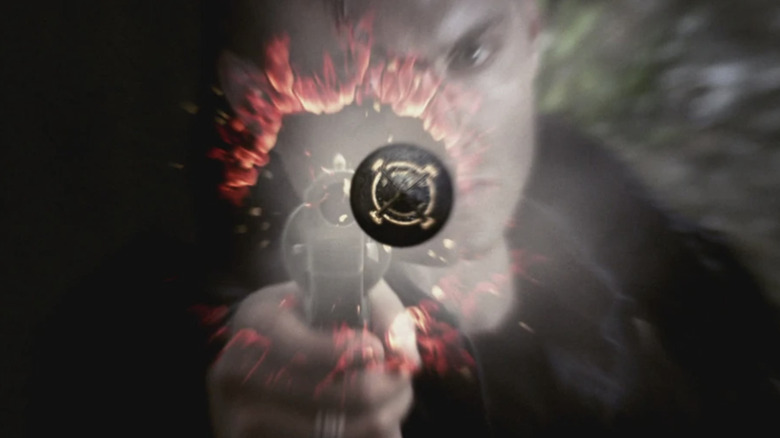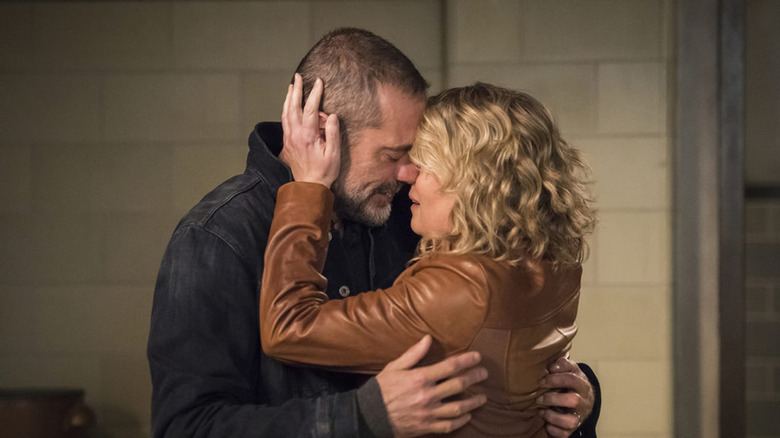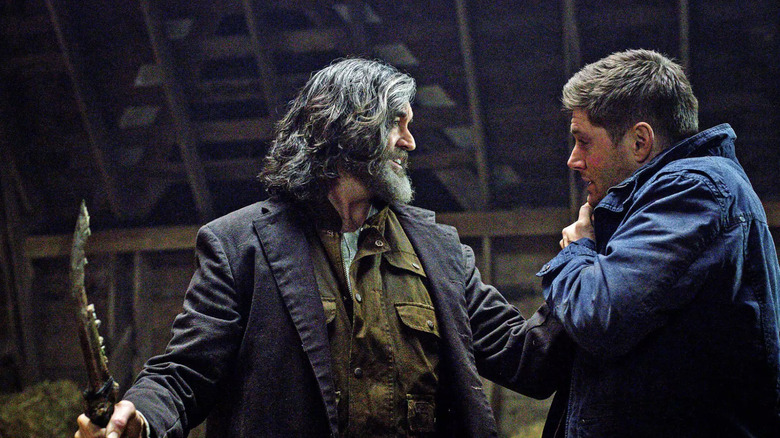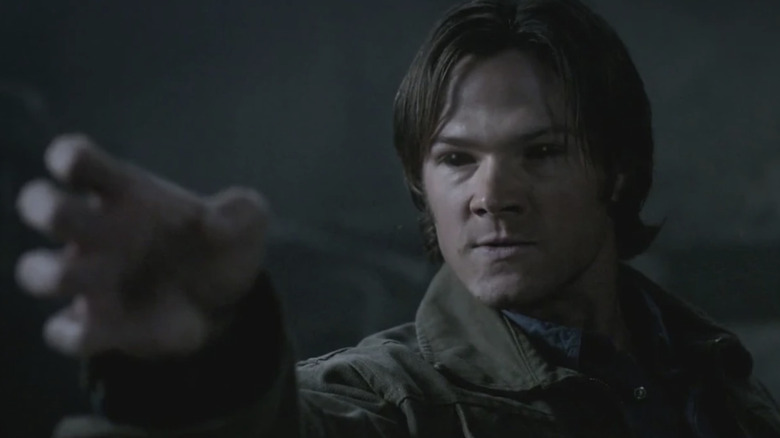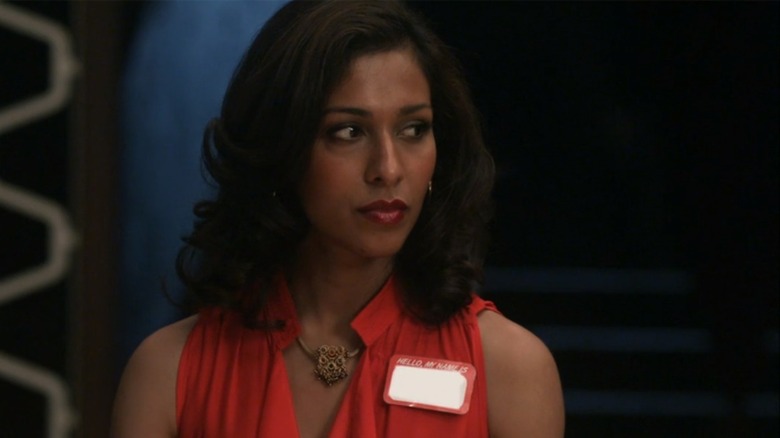Most Confusing Moments In Supernatural
"Supernatural" is a long, emotional, and — let's admit it — chaotic ride. With a rich tapestry of world-building and major changes in the writers' room during its 15 seasons, it's no surprise that there are more than a few confusing moments within its mythology and plot.
In its defense, folklore in the real world is a confounding patchwork of stories that vary from region to region and teller to teller, and religious beliefs are often complex and mysterious, so it's arguably fitting that the show's universe is sometimes baffling. Plus, no one expects perfect realism from a fantasy show. The narrative flexibility also allows writers to inject fresh ideas into the story, which is partly why it was able to run as long as it did.
Still, inconsistencies can be frustrating for fans, and sometimes creative liberties cross the line into sloppy writing. We can love a show and still admit where it could have done better. The Winchester timeline overall is a bit muddy, and there are plenty of puzzling moments within it. Below, we identify and speculate about some of the most confusing aspects of "Supernatural."
What's the deal with the Jesus juice?
Early on, "Supernatural" establishes that holy water is acidic to demons. Dean cheekily calls holy water "Jesus juice," and the brothers use it more than a few times throughout the show. From splashing it on people's faces to make sure they're not possessed to using it to distract one of Hell's minions, it's seemingly one of the brothers' most reliable tools in the ever-expanding trunk of Dean's Impala.
It's not enough to take down a demon, but it helps the brothers choose between performing an exorcism or using a demon-killing weapon. Even Abaddon (a powerful knight of Hell) and Crowley, King of Hell, flinch at the touch of holy water — though the more powerful a demon, the less effective it is. There are also torture-obsessed demons like Alastair who train themselves to fight through the sting.
Yet holy water doesn't affect every demon. Two are immune to it: Lilith and Azazel. Interestingly enough, both demons have personal relationships with Lucifer, the first demon ever created. It's possible their immunity was a gift from Satan, or that the rest of the demon-kind developed the weakness over time as the species expanded, but this is never stated.
The superpowered situation
"Supernatural" first embraced its meta side back in Season 2 when Dean and Sam encountered a trickster. Using classic tropes like alien abductions and urban legends, the episode "Tall Tales" became a classic.
Later in the show, writers took matters further by inserting God into the storyline as a metaphor for ex-showrunner Eric Kripke, making him the diabolical mastermind behind apocalypses in more than a few universes. This suggests that Dean and Sam are main characters puppet-mastered by God. Unlike the self-parodying wit of "Tall Tales," this development felt like a bridge too far.
When Dean discovers that God has given them the super-charged luck that writers often grant their protagonists, it flattens everything that's happened up to that point: it was all predestined, and the Winchester brothers had no free will. Worse, it adds nothing meaningful to the plot, except maybe making audiences feel the futility of human existence. "Supernatural" was dark enough on its own before that, thanks.
It's also not like the Winchesters have had an easy go of it. They've been beaten plenty of times by lesser beings and even other hunters. Though it's clear God's interest in them saved them from danger more than a few times, the fact that he had to do it so often makes this particular plot point clunky at best. You could argue that God had to keep things interesting for his own amusement, but it's still a stretch. Many fans consider this the point at which the series jumped the shark — more so than the Season 4 episode literally titled "Jump the Shark."
From Hell to Heaven
Continuity mistakes are common in long-running shows like "Supernatural," but some are more egregious than others. One major discrepancy in the series involves the fate of John Winchester.
Back in Season 2, John Winchester sells his soul to bring Dean back from the brink of death. After refusing to torture souls in Hell, John escapes and later leaves through the open Devil's Gate in the Season 2 finale. After he helps Dean kill Azazel, the demon who murdered Mary Winchester, his unfinished business is complete and he's allowed entry to Heaven. In Season 8, Bobby is rescued from Hell and also allowed to enter Heaven. And let's not forget Dean, who also summers in Hell, but joins Heaven's ranks by the end of the show, albeit now under Jack's auspices.
But in Season 15, God cages Kevin in Hell after promising to send him to Heaven. God explains that he's not able to go to Heaven because he's already been in Hell. Instead, he's stuck on Earth, where he'll become a vengeful spirit. The show half-explains that Bobby (and presumably John) was allowed into Heaven as an exception to the rule, since God at that time liked the Winchesters. Still, it's never articulated why God didn't make another exception for Kevin. Was it just that the Winchesters had fallen out of his favor? Did he have beef with Kevin, a Prophet? Was he just making a capricious decision for his own amusement?
That brings us to another point of confusion: Must ghosts always turn vengeful? That doesn't seem to gibe with earlier seasons, when the boys received assistance from plenty of ghosts, including Victoria in Season 7, as well as Mary's ghost and the asylum ghosts in Season 1. It should track that kindhearted individuals wouldn't automatically fall into vengeful spirit territory, though it's easy to see how isolation could sour even the best of us.
Did Jess become a ghost?
The Winchester men carry the weight of the world on their shoulders. The Season 1 murder of Jessica is an important cross for Sam to bear, especially since her death parallels the loss of his mother and its impact on his father.
One moment that's never resolved comes in the episode "Bloody Mary." When Dean asks Sam what his secret is, Sam replies that some secrets aren't meant to be shared. We later learn that Sam had nightmares about Jessica's death before it happened and feels responsible for failing to act on them.
At the end of the episode, Sam glimpses Jess on the sidewalk as he and Dean drive by. Her apparition doesn't exactly fall into the mythology of the show; typically, ghosts haunt places where they died or that were important to them when they were alive, not random street corners. Plus, Dean is pretty adept at noticing supernatural anomalies, so the fact that he doesn't seem to see her makes it likely that she's just a symbolic manifestation of Sam's guilt, not an actual spirit. The moment is never addressed but still perplexes some fans, especially since having Jessica return as a ghost could have been a rich narrative thread.
Jack doesn't destroy monsters
One of the biggest questions after the ending of "Supernatural" is why Jack didn't bring Dean back after his death. Plenty of fans were furious over Dean's fairly mundane death via vampire. He's a skilled hunter who's survived far worse; how could something so seemingly innocuous take him down? Yet that would have defeated the entire purpose of the final episode. The brothers finally give up their main character syndrome and codependency to let their lives play out naturally. Death by what basically amounts to a banal workplace injury makes sense. Any interference with that would have negated the free will they fought so hard to obtain. Plus, as Dean (hypocritically) proclaimed for over a decade, "What's dead should stay dead."
Why didn't Jack just eliminate monsters? "Supernatural" spends 15 seasons hammering in the idea that not all monsters are evil. Between vegetarian vampires like Lenore and werewolves like Garth who don't hurt anyone, destroying the entire monster population would be genocide.
Jack takes a hands-off approach to humans, honoring the concept of free will that Chuck so blatantly disregarded. Any level of stepping in for selfish reasons would lead him closer to becoming his grandfather — something nobody wants. Instead, he crafts Heaven into the paradise that Dean deserves, letting him finally rest with the family he loves, both found and blood. Although there are rationales for these creative decisions, they remain points of contention for fans.
Dean and Sam team up with their killers
Most people can't relate to swearing revenge on the dudes who killed you and then later teaming up with them. Then again, most people don't come back from the dead, either.
Back in Season 5, hunters Walt and Roy take down the Winchesters, believing that doing so will prevent the apocalypse. Without the two guys meant to jumpstart it, how can it happen, right? Walt and Roy forget one thing about the brothers: They have main character syndrome. No matter how many times Dean and Sam die, they always come back. While the hunter gossip channels may not have the full story of Dean and Sam's many resurrections, they're aware their mission might be futile. They still shoot the brothers to death, only for God to step in and resurrect them for a laugh.
The brothers initially swear revenge on Walt and Roy, but later team up with them in the Season 12 episode "Who We Are" to take on the British Men of Letters. The lack of follow-through on the revenge bit might just be a numbers game: By that point, there are barely any decent hunters left, and Roy and Walt did get the drop on the brothers before, demonstrating at least a modicum of competence. Sometimes necessity acquaints men with strange bedfellows. Plus, let's face it, the brothers have forged alliances with much worse villains than a pair of misguided, trigger-happy hunters.
Castiel's powers are ever-shifting
Castiel's "Supernatural" powers shift more than Sam's ever-growing hairstyle. At some points in the show, Cas can resurrect the dead, which seems like more of a God-like power than an angelic one. Yet other times, Cas can barely fly.
Fans can hardly keep up with Cas' fluctuating powers on an episode-to-episode basis. Most of these moments are given flimsy Grace-related explanations, but it still seems like Cas' abilities mostly relate to what an episode needs for a quick fix. That's not exactly a stellar reason to have his powers wax and wane at the drop of a feather. Sure, Cas experiences more than a few changes to his very being — from undergoing several resurrections to becoming human and eating souls as Godstiel. These kinds of character shifts play an important role in his fluctuating power dynamics. Still, it would have been helpful to fans if the writers had spent more time justifying and expanding upon these changes.
Not taking advantage of powerful weapons
It's interesting to see how the lore of "Supernatural" changed throughout 15 years of storytelling. Take Samuel Colt's demon-killing gun as an example. In Seasons 1 and 2, this object is almost as important as the Impala. The stakes feel as high as they can go. The revelation that Colt built a 100-square-mile devil's trap out of railway tracks to lock a gate to Hell is downright fascinating.
Yet the importance of Colt's weapon to the plot gradually diminishes, to the point that when Crowley sneaks away with it later in the series, the boys don't even bother looking for it. Dean even meets Colt through time travel and doesn't ask about the secret recipe for the bullets, which were once in limited supply (granted, Bobby had already found a way to make more by then).
Similarly, in the Season 1 episode "Phantom Traveler," the brothers use a hack for telling if someone is possessed: just say the Latin word for Christ, Christo, in front of the suspect, and see if they flinch. (Never mind that the Latin word for Christ is not, in fact, Christo). Yet this trick is barely used again in the series, despite numerous opportunities. And whatever happened to the Rings of the Horsemen, the objects powerful enough to unlock Lucifer's cage?
As much as we'd like tangible plot reasons for these disappearing tools, it seems only the meta aspect of the show offers a possible explanation: They make the job too easy, which makes the boy's story less fun for in-show fans and God, not to mention real-life viewers. Having a super-effective evil-killing gun and a one-word automatic demon detector saps a lot of tension from hunts. The writers never explicitly state this, but hint at it in Season 5, when convention-goers ask why the boys don't put bungee cords on their weapons or simply write the story themselves.
Is Mary and John's love story real?
The first few seasons of "Supernatural" put John and Mary's relationship on a pedestal, but as Dean notes later in the show, "It wasn't perfect until after she died." Idealizing the dead is a common aspect of grief, of course; we tend to remember the best and forget the worst about people we love.
Yet a Cupid from Season 4 takes this even further, basically retconning their entire love story by asserting that John and Mary hated each other until they were hit with a love dart. Why? Because the Winchester brothers were destined to exist, of course.
So how real was their love story? The Cupid could have been lying, but even if it did spark their initial attraction, that's only the first step in a relationship. The hardest part is working through issues and staying together during the hard times. Even more telling? John and Mary found each other in Heaven, back when Heaven consisted only of replaying your biggest earthly hits. Only soulmates find each other and live out their memories together. Whether a Cupid united them or not, John and Mary choose each other every time.
The Winchesters' missing Cain and Abel story
By Season 5 of "Supernatural," the show had established the predetermined nature of Dean and Sam Winchester's fates. The hellish-yet-heavenly Powers That Be had already decided that Dean and Sam would carry out round two of the battle between Lucifer and Michael. Michael reveals an interesting tidbit to Dean and Sam when they go back in time to see their parents in Season 5: they're descended from Biblical brothers Cain and Abel.
This is supposed to make their brotherly destiny more impactful, but it's a bit of a head-scratcher. In the Bible, Cain likely killed Abel before Abel had children, so there would be no separate line descended from Abel. Moreover, given that Dean and Sam are blood brothers, it wouldn't make sense for them to trace back to two different ancestral sires, unless Michael meant this more loosely. Compounding the confusion is the common misconception that Cain and Abel were Adam and Eve's only children, which would mean we're all descended from Cain and the Winchesters are thus nothing special (Adam and Eve had at least one other son, Seth, and possibly many other children). It doesn't help that "Supernatural" never quite landed on a genetic origin story for humanity despite introducing characters like Eve.
We never get closure on this storyline. Dean eventually meets Cain, who sets the record straight that he killed his brother to save his soul from Lucifer, damning himself in the process. Sound familiar? Yet outside of Cain casually calling Dean "son," their possible genetic connection is never discussed. You'd think such an interesting assertion would be worth addressing, especially since Dean's ability to carry the Mark of Cain could have something to do with his lineage.
Sam's power inconsistancies
Sam's abilities are just as chaotic as Castiel's. The younger Winchester goes from having future-predicting nightmares to guzzling demon blood to exorcize demons with his mind. In the first few seasons, Sam's powers are relatively consistent, only changing dramatically when he comes back from Hell in Season 6 to find them almost entirely dormant. Yet even in the first five seasons of the show, Sam's main power of premonition mostly disappears after Azazel's lovely little conference (read: death match) for special children.
There is one interesting possibility hinted at later in the show. Once Sam's powers seemingly disappear, he starts dabbling in witchcraft with Rowena and finds that he's really good at it. Sam becomes something of a magical prodigy when none of the other Winchesters have shown any prowess in this area (admittedly, it's unlikely that any of them would even have tried). It's possible that Sam channeled some of his inert abilities into magic, opting for focused spell work rather than chaotic bursts of largely uncontrollable power.
The show's multicultural pantheon of deities
Before the fourth season of "Supernatural," the origin of humanity isn't exactly fleshed out. While Sam is religious and believes in God, Dean is more jaded, having watched Mary, a believer, die at such a young age. At this point, the show seems like a cultural mishmash, showcasing a variety of occult creatures and the pagan pantheon as much as demons, angels, and other figures from Christianity. The jury's still out on aliens, but pretty much every other extramundane entity you can think of makes an appearance, from Japanese shojos to Jewish golems.
Sure, Christianity is at the forefront given the major demon role, but up until Castiel's entrance, we had no proof Heaven existed in the show's canon, only Hell. Even after angels are established, God is still absent, and his role in the creation of the universe(s) isn't clear — until we discover that the prophet Chuck is actually God. Once Season 11 comes along, the show has fully embraced the Judeo-Christian take on the creation of the world, albeit with a sinister twist. What about other deities? In "Hammer of the Gods," the Winchesters meet a whole host of gods and deities from all cultures. So, how does this diversity play into the Christian origins of the show's world?
Season 1 introduces the idea of a tulpa — a being created through thought. It's not beyond the realm of possibility that, over the years, belief systems might take on a life of their own. Season 3's "A Very Supernatural Christmas" shows pagan gods losing their power because of a lack of believers, so that idea tracks. Another possibility is that Chuck got bored and wanted to create adversaries for himself that weren't as powerful to boost his ego.
